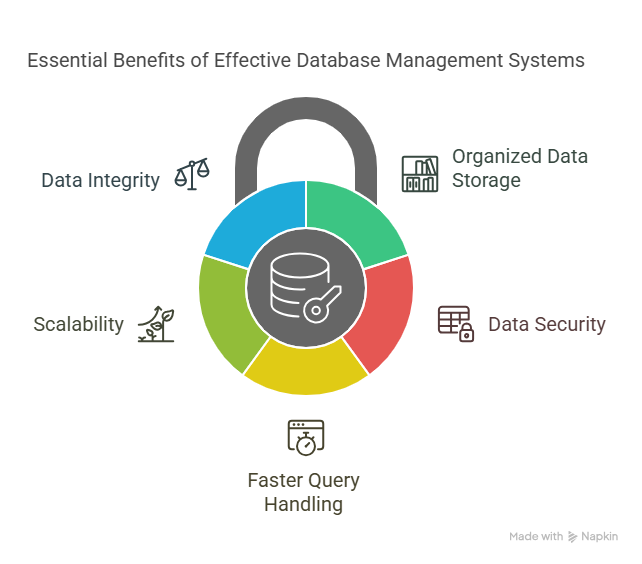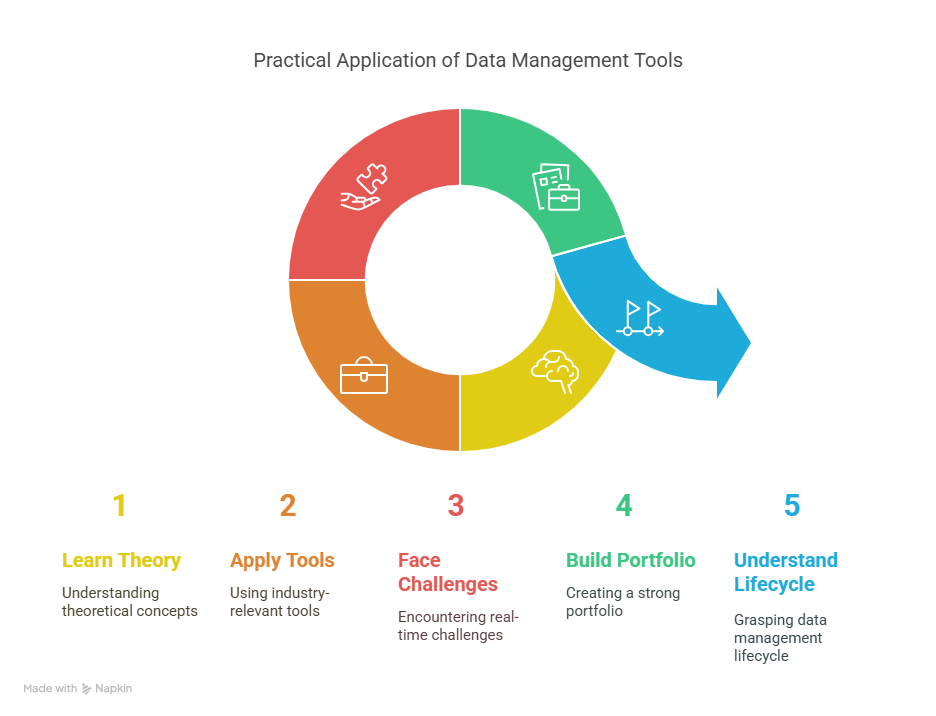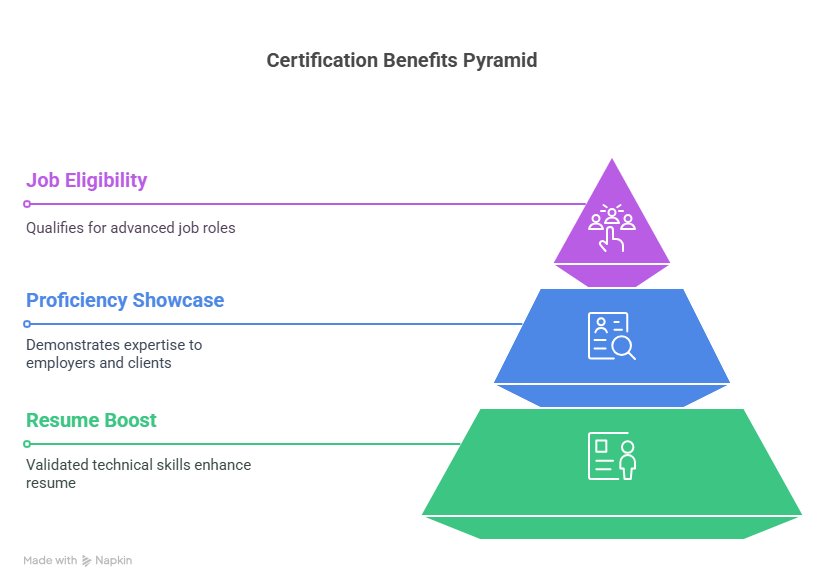In today’s data-driven world, managing and organizing data efficiently is crucial for businesses across all sectors. Database Management Courses have become a critical part of IT and data education, enabling professionals and students to master the skills required to manage, store, retrieve, and analyze large volumes of data with precision. At Elysium Academy, our Database Management Courses are designed to equip learners with hands-on expertise in the most powerful and widely-used tools in the industry.
Whether you’re a beginner aiming to enter the tech world or a professional looking to upskill, understanding the key tools used in database management is essential. In this blog, we will explore 9 powerful tools commonly taught in professional Database Management Courses and explain how each plays a pivotal role in managing modern data ecosystems.
Why Learn Database Management Courses?
In the digital age, where every click, transaction, or interaction generates data, learning Database Management Courses is no longer optional — it’s essential. These courses prepare individuals to efficiently handle and manipulate data, the most valuable asset in today’s technology ecosystem. Here’s why mastering database management is critical:

Organized Data Storage
One of the core objectives of database management is to systematically store vast amounts of data in a structured format. Instead of scattered, redundant files or spreadsheets, a well-managed database ensures that data is stored in normalized formats with relationships clearly defined. This reduces duplication, saves storage space, and ensures consistency across records — especially in large systems like banking platforms, hospital management software, or e-commerce websites.
Data Security
Data security is paramount in today’s world, especially with the increasing threats of data breaches and cyberattacks. Database Management Systems (DBMS) provide robust security mechanisms including user authentication, role-based access control, encryption, and transaction logs. Through Database Management Courses, learners understand how to configure security protocols to protect sensitive data — such as customer information, payment details, or health records — from unauthorized access or manipulation.
Faster Query Handling
Speed and efficiency in data retrieval are essential for maintaining user satisfaction and operational effectiveness. Well-structured databases with proper indexing and optimization techniques can drastically reduce the time it takes to run queries. For instance, a banking system querying user account details or a logistics platform tracking shipments in real time all depend on fast, reliable query execution. These techniques are thoroughly covered in courses to help students learn how to design high-performance databases.
Scalability
As businesses grow, so does their data. A key benefit of modern DBMS tools is their ability to scale — both vertically (adding more resources to the existing setup) and horizontally (adding more nodes or servers). Whether you’re managing data for a small startup or a multinational corporation, the tools you learn in Database Management Courses help you design databases that can adapt to the growing size and complexity of data, without compromising on performance or stability.
Data Integrity
Data integrity ensures that the data within a database remains accurate, consistent, and trustworthy throughout its lifecycle. This involves implementing constraints (such as primary keys, foreign keys, and check constraints), validation rules, and transaction controls that maintain consistency even in the event of system crashes or power failures. Maintaining data integrity is vital for reliable reporting, decision-making, and regulatory compliance — all of which are emphasized heavily in training programs.
9 Powerful Tools Taught in Database Management Courses Programs
The following table highlights the tools, their primary use, and what you can expect to learn about each one in the course.
| S.No | Tool Name | Primary Use | Key Learning Outcomes in Courses |
|---|---|---|---|
| 1 | MySQL | Open-source relational database | SQL queries, schema design, normalization, indexing |
| 2 | Oracle Database | Enterprise-level RDBMS | PL/SQL programming, database tuning, performance optimization |
| 3 | Microsoft SQL Server | Business intelligence and analytics | T-SQL, SSIS, SSRS, backup and recovery |
| 4 | MongoDB | NoSQL, document-oriented database | CRUD operations, schema-less design, aggregation framework |
| 5 | PostgreSQL | Advanced open-source object-relational DBMS | Data types, functions, triggers, advanced SQL |
| 6 | SQLite | Lightweight embedded RDBMS | Mobile apps database, lightweight data storage |
| 7 | Cassandra | Distributed NoSQL database for big data | Data replication, fault tolerance, scalability |
| 8 | Redis | In-memory key-value data store | Caching, session storage, real-time analytics |
| 9 | phpMyAdmin | Web-based MySQL administration tool | GUI-based management, user privileges, export/import operations |
In-Depth Overview of Each Tool
MySQL
MySQL is the backbone of web applications and is widely used in LAMP (Linux, Apache, MySQL, PHP) stacks. Elysium Academy covers foundational topics like schema design, SQL query optimization, joins, triggers, and stored procedures.
Oracle Database
Oracle is the preferred choice for enterprise applications. Learners at Elysium Academy gain exposure to PL/SQL, transaction control, data warehousing concepts, and performance tuning methods.
Microsoft SQL Server
This robust tool is essential for those entering enterprise and analytics roles. You’ll learn about SSMS, reporting through SSRS, and data integration using SSIS. The Database Management Courses at Elysium Academy offer hands-on labs to simulate real-world business scenarios.
MongoDB
MongoDB is a leader in NoSQL databases. Our course teaches you document structure, querying via BSON, replication, and sharding. You’ll also learn about MongoDB Atlas for cloud-based implementation.
PostgreSQL
This tool is ideal for those who want open-source flexibility with enterprise features. Elysium Academy focuses on advanced SQL, indexing, full-text search, and procedural languages like PL/pgSQL.
SQLite
Used widely in mobile apps and embedded systems, SQLite requires minimal configuration. It’s perfect for lightweight applications, and our course introduces students to mobile database integration.
Apache Cassandra
Cassandra is all about managing massive volumes of data across distributed nodes. You’ll study data modeling, replication strategy, and consistency tuning.
Redis
A blazing-fast, in-memory database. Redis is used for caching and real-time analytics. You’ll work with key-value pairs, lists, sets, and pipelines.
phpMyAdmin
This tool simplifies MySQL database management. It’s GUI-based, making tasks like data backup, user permissions, and visualizing ER diagrams easy to learn.
Benefits of Learning These Tools at Elysium Academy
Real-Time Projects: Hands-on Experience with All 9 Tools
Understanding theory is important — but being able to apply it in real-world situations is what truly builds confidence. At Elysium Academy, every student works on real-time projects that simulate professional scenarios. Whether you’re building an e-commerce database using MySQL, designing a NoSQL model for unstructured data using MongoDB, or optimizing performance in Oracle, each of the 9 powerful tools is taught through practical, industry-relevant use cases. These projects help you:

-
Build a strong portfolio for interviews
-
Understand the end-to-end data management lifecycle
-
Face real-time challenges like query optimization, data migration, and security management
Expert Instructors: Learn from Certified Professionals
Our faculty isn’t just academically qualified — they are certified professionals with real-world industry experience. With years of working in sectors like IT, banking, logistics, and healthcare, our trainers bring in valuable insights that go beyond textbooks. You’ll gain:
-
Mentorship from instructors who understand current industry trends
-
Exposure to enterprise-level projects and tools
-
Insights into the latest advancements in database technologies
Placement Assistance: 100% Job-Oriented Training
Elysium Academy approach is designed around career transformation. From resume building and mock interviews to soft skills training and aptitude development, our dedicated placement cell ensures that learners are job-ready from day one. The training includes:
-
Access to job openings across top companies
-
Interview prep with database-specific questions
-
Support for both fresher and lateral job seekers
This job-oriented framework increases your visibility to recruiters and gives you the confidence to crack technical interviews with ease.
Course Certifications: Industry-Recognized Credentials
Every student who completes a Database Management Course at Elysium Academy receives a certificate that reflects their hands-on skills. These credentials are aligned with current industry demands and demonstrate your competency in tools like SQL Server, Cassandra, PostgreSQL, and more. Certification benefits include:

-
Boosting your resume with validated technical skills
-
Showcasing your proficiency to employers and clients
-
Meeting eligibility criteria for advanced job roles
Customized Learning Paths: Beginners to Advanced Levels
At Elysium Academy, we believe that learning should be tailored to your background, goals, and pace. Whether you’re a novice stepping into the world of databases or an experienced professional seeking advanced insights, we offer:
-
Foundational modules for absolute beginners
-
Intermediate and advanced lessons for experienced learners
-
Personalized guidance to choose the right tool based on your career path
This flexible learning structure ensures that every student — regardless of their starting point — finds value and growth throughout the course.
Career Opportunities After Database Management Courses
Completing Database Management Courses from Elysium Academy opens up multiple career avenues across different domains. Here’s a look at the top job roles and what they typically involve:
| Role | Industry Sectors | Core Responsibilities |
|---|---|---|
| Database Administrator | IT, Healthcare, Finance | Managing, backing up, and securing databases |
| Data Analyst | E-commerce, EdTech, Retail | Interpreting data, creating reports, data cleansing |
| SQL Developer | Banking, Software Services | Writing and optimizing SQL queries, data modeling |
| Big Data Engineer | Telecom, AI, Analytics | Handling large-scale data systems and pipelines |
| NoSQL Specialist | IoT, Cloud Computing | Working with flexible, scalable NoSQL data models |
These roles require a strong foundation in tools like MySQL, MongoDB, Cassandra, and more — all of which are covered comprehensively in our training programs. Whether you’re aiming for system stability, data insights, or scalable architectures, your career path in database management will be both versatile and future-ready.
FAQs About Database Management Courses
1. What are the prerequisites to join a database management course?
Basic knowledge of computers and logical reasoning is enough. Programming knowledge is helpful but not mandatory.
2. Are these tools relevant to real-world industry applications?
Absolutely. These tools are widely used across software companies, startups, and MNCs for data handling, application development, and analysis.
3. Can I learn these tools online?
Yes. Elysium Academy offers flexible online learning options, complete with recorded lectures, live sessions, and project mentorship.
4. Will I receive certifications?
Yes. Upon successful completion of the course, you’ll receive certifications recognized by IT recruiters globally.
5. How long does it take to complete the course?
Our standard Database Management Courses last between 3 to 6 months depending on the depth and learning mode (part-time/full-time).
Conclusion
In the fast-evolving world of technology, database management is no longer just a back-end job — it’s a strategic role. Learning the right tools through Database Management Courses at Elysium Academy prepares you for a future-ready career. With hands-on exposure to tools like MySQL, Oracle, MongoDB, and more, you’ll be equipped to solve real-world data challenges across diverse domains.
Whether you aim to be a database administrator, developer, or data analyst, mastering these 9 powerful tools is your gateway to success. Enroll in Elysium Academy Database Management Courses and transform your data handling abilities into career-defining skills.
















